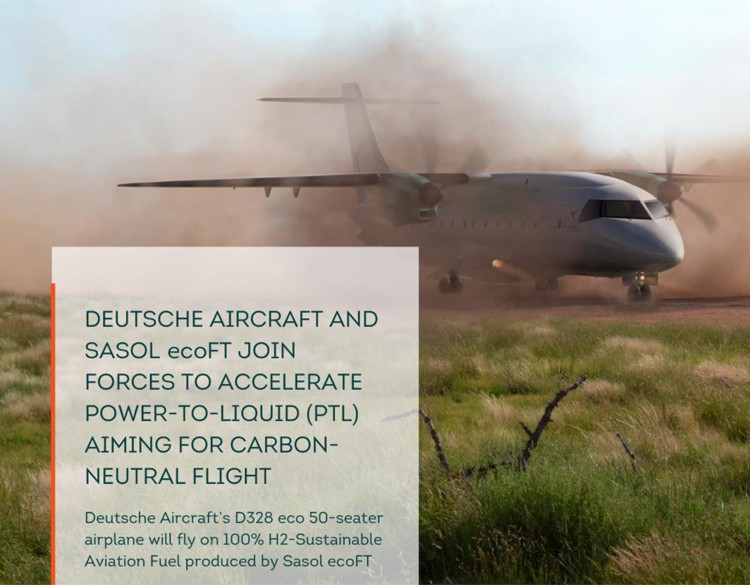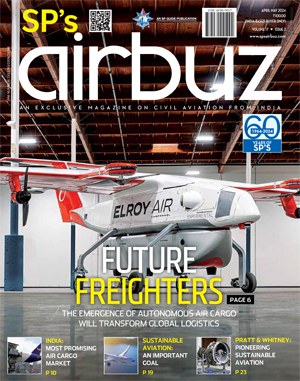Sasol ecoFT and Deutsche Aircraft join forces to accelerate Power-to-Liquid (PtL) aiming for near carbon-neutral flight
- Deutsche Aircraft and Sasol ecoFT sign Memorandum of Understanding (MoU) to advance sustainable aviation fuel research
- Both partners seek to establish a certified Power-to-Liquid application (H2-SAF) to produce sustainable aviation fuel
- The partnership will also pursue certification as drop-in jet fuel

German aircraft manufacturer Deutsche Aircraft and South African chemicals and energy company Sasol have signed a MoU on a joint research project for H2-SAF (PtL) applications in aviation. The two companies plan to further collaborate on the certification of sustainable drop-in jet fuels and the ramp-up of PtL use in aviation.
With its D328eco program, Deutsche Aircraft is working on an airplane in the under 50-seat market, that will achieve near carbon neutrality. The plane that is scheduled to enter service by 2025 will be able to use any certified sustainable aviation fuel and regular kerosene, as well as PtL-based fuels.
Sasol ecoFT is an ideal partner for that task as the South African company is the world leader in FT (Fischer-Tropsch) technology. Sasol ecoFT leverages Sasolís extensive FT experience, proprietary technology, and catalysts to produce sustainable fuels and chemicals via Power-to-X processes.
Sasol ecoFT and Deutsche Aircraft have both recognized the urgency in transitioning towards climate neutral aviation.
From a fossil heritage to a sustainable future
"Sasol ecoFT and Deutsche Aircraft stand at the beginning of a decarbonization journey. We both have products originally designed in the age of fossil fuels. Together we can develop rapid solutions to combat climate change by improving our products while building on our heritage and expertise," comments Dave Jackson, CEO of Deutsche Aircraft.
The H2-SAF (PtL) application is a scalable, long-term solution to minimize the carbon dioxide (CO2) footprint of aviation. The process uses CO2, recycled from regular air, and hydrogen, produced with green energy, to form a synthetic fuel. Fuels manufactured like this still have the same performance characteristics as regular kerosene: high energy density at low volume, proven safety, and full compatibility with established infrastructures. Furthermore, these substances contain less aromatics and sulphur, thus improving local air quality and reducing the high-altitude impact of aviation.
Deutsche Aircraft and Sasol will not only work on producing H2 based PtL but also aim at a certification for this type of fuel to be used as drop-in jet fuel.
From Coal-to-Liquid to H2-SAF
The H2-SAF (PtL) application is similar to Coal-to-Liquid (CtL) applications, in which Sasol has deep global experience at deploying at industrial scale. As a first step of their research partnership Sasol ecoFT and Deutsche Aircraft will explore the compatibility of materials and system components with blended synthetic fuels produced through Sasolís FT technology currently applied in its existing CtL process. The priority of this aspect of the project is to expedite the certification of more sustainable PtL options.
"We are extremely excited about the partnership with Deutsche Aircraft as we take a holistic approach to climate-neutral aviation by looking at the whole value chain from fuel production up to aircraft system level. Joining forces between aircraft manufacturers and fuel producers is vital if we want to ensure that aviation becomes sustainable, while ensuring the highest possible safety standards," concluded Helge Sachs, Senior Vice President, of Sasol ecoFT.





